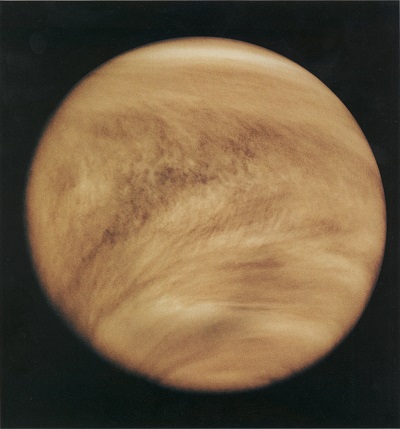New York, (Samajweekly) Venus may be a (slightly) gentler place and bolts of lightning may not very often flash from Venus’ thick, acidic clouds, as thought previously, a new study suggests.
Known as Earth’s twin, Venus is one of the most mysterious, and inhospitable, bodies in the solar system.
The planet is about the same size as Earth, but has a dense, carbon dioxide-rich atmosphere and a searing temperatures of 900 degrees Fahrenheit and crushing atmospheric pressures.
No spacecraft has ever survived for more than a few hours on the planet’s surface.
In the research, space physicists at University of Colorado-Boulder, US, took data from NASA’s Parker Solar Probe, which launched in 2018 as part of a 7-year mission to investigate the physics of the sun’s corona, or outermost atmosphere, and the solar wind.
In February 2021, the spacecraft swooped around Venus at a distance of roughly 1,500 miles. In the process, its instruments picked up dozens of what scientists call “whistler waves” — pulses of energy that, on Earth at least, can be kicked off by bolts of lightning.
The team’s data, detailed in the journal Geophysical Research Letters, showed that Venus’ whistler waves may not actually originate from lightning, but rather from disturbances in the weak magnetic fields that envelop the planet. The results agree with a 2021 study, which failed to detect radio waves generated by lightning strikes coming from Venus.
“There’s been debate about lightning on Venus for close to 40 years,” said lead author Harriet George, a postdoctoral researcher at the varsity’s Laboratory for Atmospheric and Space Physics (LASP).
“Hopefully, with our newly available data, we can help to reconcile that debate.”
Much of the debate around Venus and lightning dates back to 1978 when a NASA spacecraft called Pioneer Venus entered into orbit around Earth’s hotter, angrier twin. Almost immediately, the spacecraft began picking up the signals of whistler waves hundreds of miles above the planet’s surface.
For many scientists, these signals were reminiscent of a familiar phenomenon from Earth: lightning.
George noted that, on Earth, whistler waves are often — but not always — created by lightning. Lightning strikes, she said, can jostle electrons in the planet’s atmosphere, which then launch waves that spiral out into space. These waves create whistling tones that early radio operators on Earth could hear using headphones, hence the name “whistlers”.
If Venus’ whistler waves have a similar origin, then the planet might be a monster of lightning, experiencing roughly seven times more strikes than Earth. Scientists have also spotted lightning on Saturn and Jupiter.
“Some scientists saw those signatures and said, “That could be lightning,'” George said. “Others have said, “Actually, it could be something else.” There’s been back and forth about it for decades since.” Parker Solar Probe could offer scientists an opportunity to resolve the debate for good, the team said.










